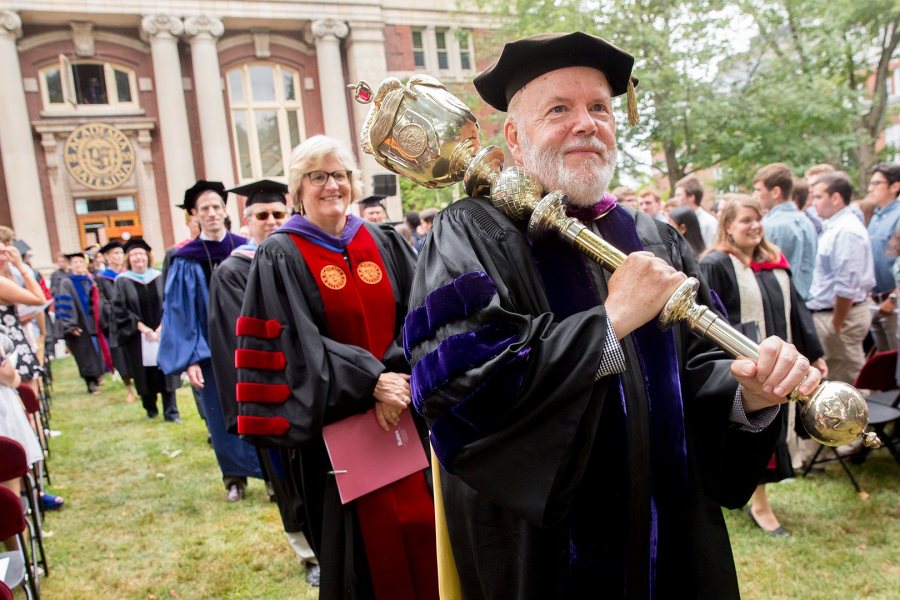
College a ‘perfect time to take stock,’ Gediman tells 2016 Convocation
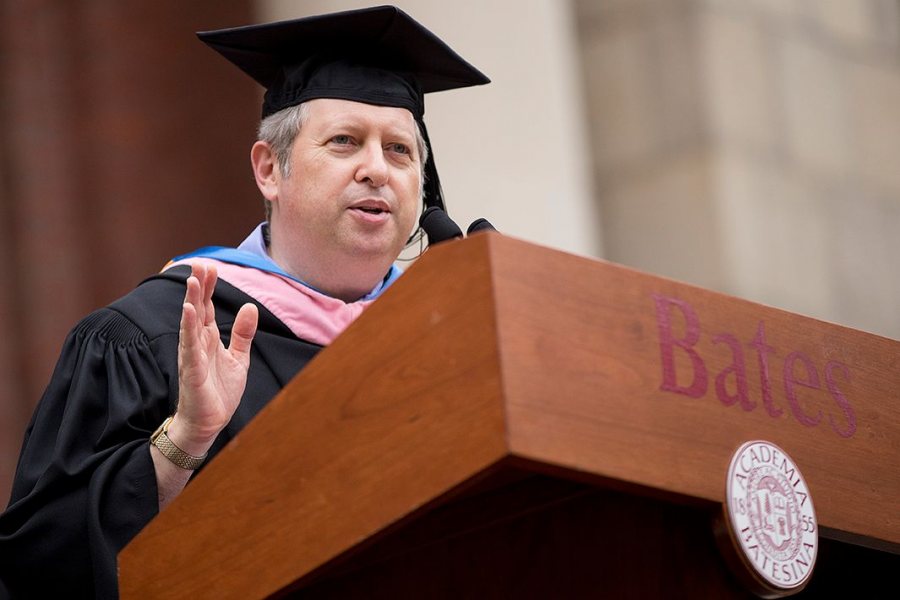
Dan Gediman, co-creator of the “This I Believe” radio and book series, delivers the Convocation address on the historic Quad on Sept. 6, 2016. (Phyllis Graber Jensen/Bates College)
For Bates’ 2016 Convocation speaker, college was “the perfect time to take stock of what I most enjoy doing and the things that brought great joy to me and that really intrigued me — and to sculpt out of that raw material a career that I’m still in today.”
Dan Gediman, a renowned radio producer and co-creator of the This I Believe series of books and radio spots, offered that encouragement to the 499 members of the Class of 2020 during a wide-ranging and personal address on Sept. 6, 2016.
Gediman’s career reflections and their lessons for the new students formed the centerpiece of an hourlong Convocation ceremony on Sept. 6. The event served not only as a welcome to the new students and the new school year, but as an introduction to the ethos of the Bates community in the context of This I Believe.
Under milky skies, Gediman shared the Coram Library stage with Bates President Clayton Spencer, Student Government President Adedire Fakorede ’18 of Newark, N.J., and Multifaith Chaplain Brittany Longsdorf.
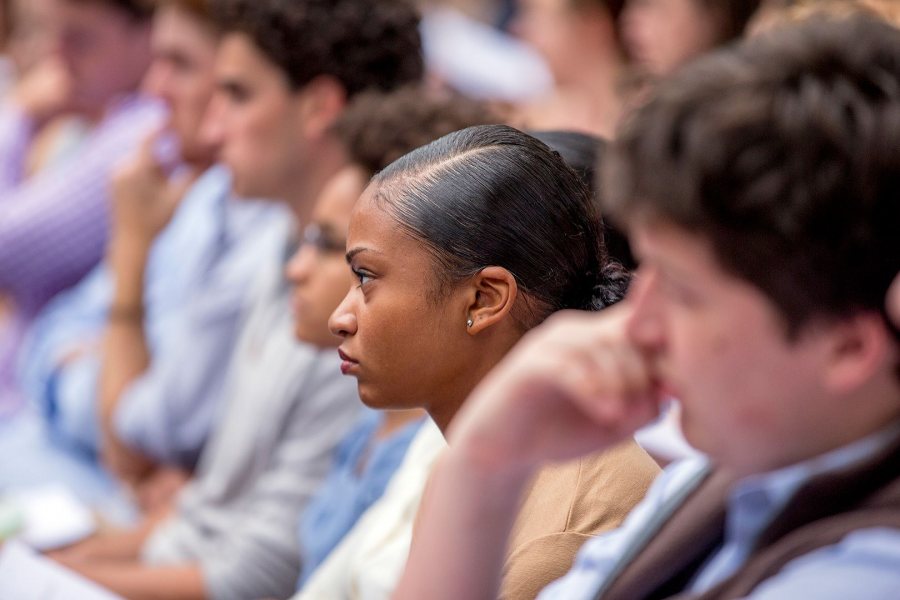
Members of the Bates Class of 2020 listen to a Convocation speaker on the morning of Sept. 6, 2016. (Phyllis Graber Jensen/Bates College)
The first in Gediman’s series of This I Believe books was assigned to the incoming class as its Common Reading, an initiative that helps introduce the first-years to the prevailing values at Bates.
Borrowing the title and concept from a 1950s CBS radio series and book adaptation, the latter-day This I Believe project gives people from all walks of life a channel to share their essential philosophies with the world.
Gediman related a conversation with Spencer just minutes before the Convocation processional. “We only can see when we get older and we look back on life: the journey that we took to get where we are today.”
His journey was a serendipitous one that seemed to illustrate the Louis Pasteur quotation “Chance favors the prepared mind.” Gediman recounted, for example, how he decided to attend Antioch College because of a long conversation with the legendary Boston disk jockey Charles Laquidara: If the young Gediman wanted to be in radio, the WBCN personality advised, he should start by attending a school with a great campus station.
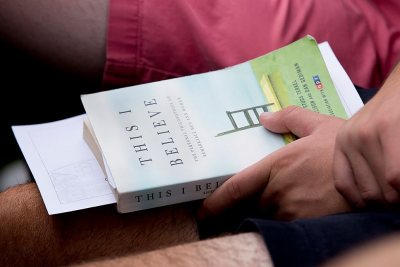
A first-year student holds a copy of the Common Reading assigned to the Class of 2020. Dan Gediman, co-editor of the “This I Believe” books and executive producer of NPR’s “This I Believe” radio program, delivered the Convocation address on Sept. 6. (Phyllis Graber Jensen/Bates College)
Gediman also explained how a grant proposal that he submitted, almost capriciously, as a college senior ultimately led to his first national gig for public radio. And how, making ends meet as a street musician after funding for his radio documentaries dried up, he happened to meet his wife.
And how a bad case of the flu in 2003 led him to resurrect This I Believe: Feverish and bored, he read the book adaptation of the 1950s radio program hosted by journalism icon Edward R. Murrow. “I was utterly transfixed and transformed” by the book, Gediman said.
With producer and series host Jay Allison, Gediman created the This I Believe radio series for NPR in 2005, and he continues to produce podcasts and books under the TIB brand.
Often in his career path, Gediman said, “fate intervened.” (That happens.) But the liberal arts education at Antioch equipped him to make the best of all those twists and bumps in the road, Gediman said (including meeting his wife, because a charismatic professor had encouraged him to develop his interest in music).
Although Gediman entered college with no clear idea about what he wanted from an education or from life, Antioch helped him develop two youthful passions — for radio and music — central to his professional and creative life. (In addition to his TIB work, Gediman is a singer-songwriter with four records to his credit.)
His education gave him “a taste for curiosity, a taste for reading, a taste for studying,” and a taste for following facts to see where they lead, Gediman said.
“This is an amazing journey that’s in front of you, and you have no idea where it’s going. You can think of that as something terrifying or you can think of that as something amazingly exciting.”
“I’m sure you came here with certain expectations on the part of your parents and guidance counselors and various advisers.” Yet, Gediman urged, “Just be open-minded. . . . Taste everything that a liberal arts education has to offer.” He added, “I want you, if you get nothing else out of my talk today, to not fear failure, to not fear setbacks.”
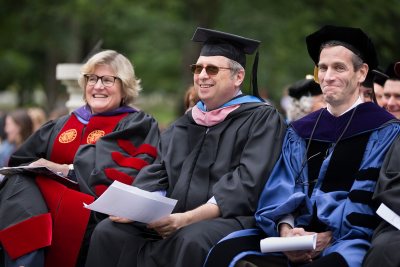
Bates President Clayton Spencer, Convocation speaker Dan Gediman and Dean of the Faculty Matt Auer react to a light moment in Student Government President Adedire Fakorede’s greeting to the Bates Class of 2020. (Phyllis Graber Jensen/Bates College)
In her opening remarks, Bates President Clayton Spencer offered a special welcome to the Class of 2020. “I love the ring” of that number, she said.
“It suggests a sharpness of focus, a clarity of vision,” she joked. “So we’re delighted that you can see so clearly that Bates is where you belong.” (In that case, one wondered, were members of other classes more likely to make spectacles of themselves?)
More seriously, she advised the newbies to “dive into your courses, branch out to make friends, be deliberate in thinking about how you move through life on this campus — because it’s great practice for figuring out how you wish to move through the world.”
If Gediman’s name is on the This I Believe dust jacket, it was the Bates president who set the book in the Convocation context. She suggested that the premise of the TIB project — the celebration of core beliefs held by all kinds of people — is analogous to the liberal arts campus.
“The variety of perspectives is great, and the unity lies in the realization that knowledge and feeling and experience begin to take shape in front of us as we move through the world,” she said. “And over time, if we are awake and aware, they come to consciousness as a set of values that guide us. In the liberal arts, we sometimes call this living an examined life.”
In view of the “downright frightening” state of current political and social discourse, she added, “This is a particularly important moment to pause and consider how one develops a personal belief system, and how that process interacts with the values and belief systems of others.”
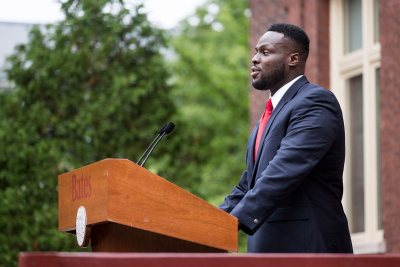
Adedire A. Fakorede ’18 of Newark, N.J., president of the Bates College Student Government, greets Bates’ newest students during Convocation 2016. (Josh Kuckens/Bates College)
Spencer found herself drawn to a TIB essay by Iran native Azar Nafisi, a literary scholar living in the U.S. and the author of Reading Lolita in Tehran. “I believe in empathy,” Nafisi wrote in her 2003 essay. “I believe in the kind of empathy that is created through imagination and through intimate, personal relationships.”
For Nafisi, Spencer said, empathy entails curiosity about the fate of others. “It is this urge to know more about ourselves and others that creates the shock of recognition, of our shared humanity.
“Without empathy, Nafisi insists, there can be no genuine dialogue, and we as individuals and nations will remain isolated and alien, segregated and fragmented,” Spencer said. “There is no better place than a residential liberal arts college to learn empathy, to practice the art of entering curiously and imaginatively into the lives of others.”
Welcomed with generous applause, Fakorede offered the formal greeting to the new class. His overriding message was an oldie-but-goodie that works for everyone but may be especially apt for 18-year-olds: “Just be yourself and people will like you.”
“Your real personality is what brings friends and family to you. And being yourselves is what makes our school the very wonderful, vibrant, and diverse community that we call Bates.”
In her benediction, Longsdorf built a metaphor of plants growing in soil nourished by the wisdom and kindness of the adults on campus. She told the Class of 2020, “Learn to be alive and thrive in this light-filled place.”
